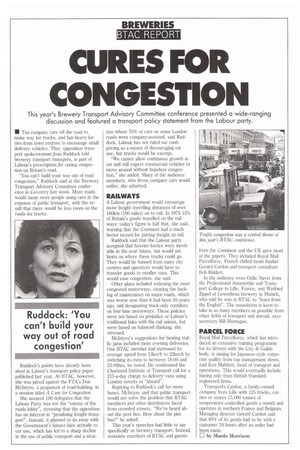CURES FOR CONGESTION
Page 50

If you've noticed an error in this article please click here to report it so we can fix it.
This year's Brewery Transport Advisory Committee conference presented a wide-ranging discussion and featured a transport policy statement from the Labour parry.
• Tax company cars off the road to make way for trucks, and ban heavy lorries from town centres to encourage small delivery vehicles. That, opposition transport spokeswoman Joan Ruddock told brewery transport managers, is part of Labour's prescription for curing congestion on Britain's road.
"You can't build your way out of road congestion," Ruddock said at the Brewery Transport Advisory Committee conference in Coventry last week. More roads would mean more people using cars at the expense of public transport, with the result that there would be less room on the roads for trucks.
Ruddock's points have already been aired in Labour's transport policy paper published last year. At BTAC, however, she was pitted against the FTA's Don McIntyre, a proponent of road-building, in a session titled A Cure for Congestion.
She assured 180 delegates that the Labour Party was not the "enemy of the roads lobby", stressing that the opposition has no interest in "penalising freight transport". Instead, it planned to do away with the Government's laissez-faire attitude to car use, which has led to a sharp decline in the use of public transport and a situa
tion where 70% of cars on some London roads were company-assisted, said Ruddock. Labour has not ruled out roadpricing as a means of discouraging car use, but trucks would be exempt.
"We cannot allow continuous growth in car and still expect commercial vehicles to move around without hopeless congestion," she added. Many of the audience members, who drove company cars would suffer, she admitted.
RAILWAYS
A Labour government would encourage more freight travelling distances of over 160km (100 miles) on to rail. In 1975 15% of Britain's goods travelled on the railways: today's figure is half that, she said, warning that the Continent had a much better record for putting freight on rail.
Ruddock said that the Labour party accepted that heavier lorries were inevitable in the near future, but would set limits on where these trucks could go. They would be banned from many city centres and operators would have to transfer goods to smaller vans. This would ease congestion, she said.
Other plans included widening the most congested motorways, clearing the backlog of maintenance on major roads, which was worse now than it had been 10 years ago, and designating truck-only corridors on four-lane motorways. These policies were not based on prejudice or Labour's traditional links with the rail unions, but were based on balanced thinking, she stressed.
McIntyre's suggestions for beating traffic jams included more evening deliveries. One BTAC member had increased its average speed from 131onfh to 22km/h by switching its runs to between 18:00 and 23:00hrs, he noted. He condemned the Chartered Institute of Transport call for a 215-a-day charge to delivery vans using London streets as "absurd".
Replying to Ruddock's call for more buses, McIntyre said that public transport would not solve the problem that BTAC members and other distributors faced from crowded streets. "We've heard about the post bus. How about the pint bus?" he asked.
This year's speeches had little to say specifically on brewery transport. Instead, associate members of BTAC and guests from the Continent and the UK gave most of the papers. They included Royal Mail Parcelforce, French chilled foods haulier Gerard Cardon and transport consultant Bob Riddett.
In the audience were Odile Navet from the Professional Automobile and Transport College in Lille, France, and Winfried Zippel of Lowenbrau brewery in Munich, who said he was at BTAC to "learn from the English". The association is keen to take in as many members as possible from other fields of transport and abroad, says secretary Bill Montague.
PARCEL FORCE
Royal Mail Parcelforce, which has introduced an extensive training programme for its drivers with the City & Guilds body, is aiming for Japanese-style corporate quality from top management down, said Ken Mabbett, head of transport and operations. This would eventually include buying only from British Standardregistered firms.
Transports Cardon, a family-owned company from Lille with 125 trucks, carries or stores 15,000 tonnes of temperature-controlled goods a month and operates in northern France and Belgium. Managing director Gerard Cardon said that 80% of its goods had to be with a customer 24 hours after an order had been made.
by Murdo Morrison
























































































































































